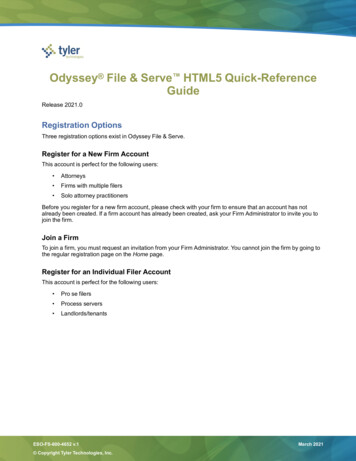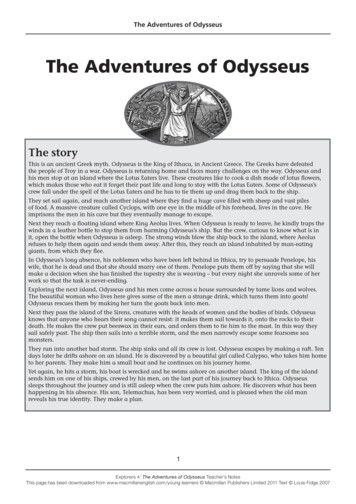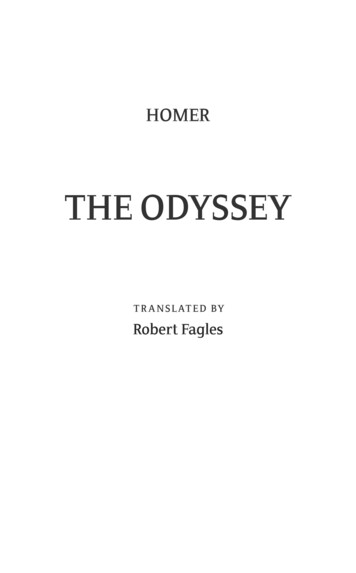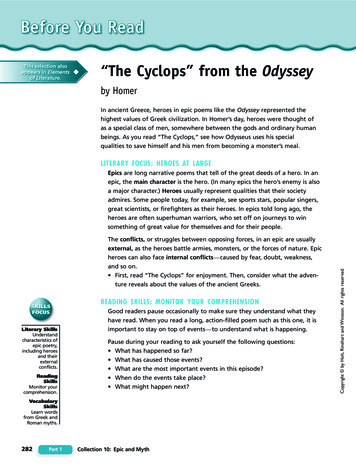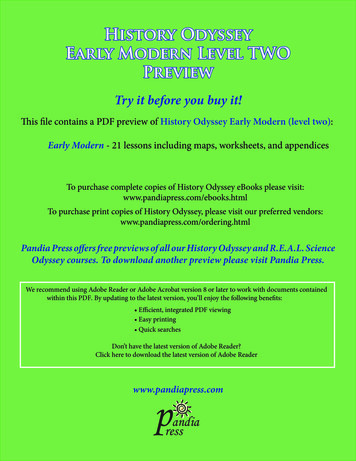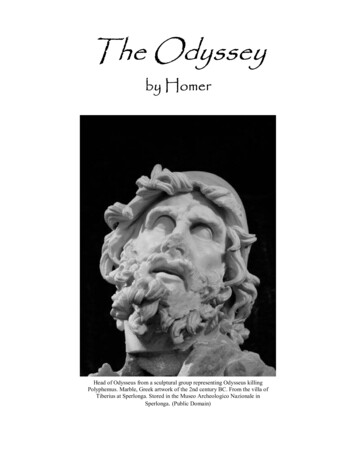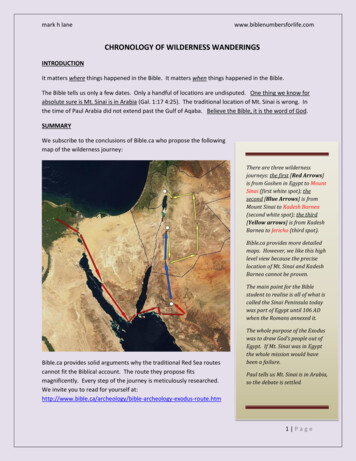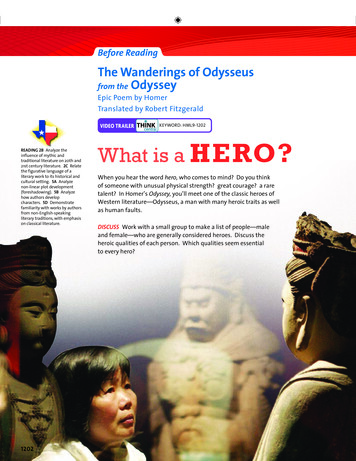
Transcription
Before ReadingThe Wanderings of Odysseusfrom the OdysseyEpic Poem by HomerTranslated by Robert FitzgeraldVIDEO TRAILERREADING 2B Analyze theinfluence of mythic andtraditional literature on 20th and21st century literature. 2C Relatethe figurative language of aliterary work to its historical andcultural setting. 5A Analyzenon-linear plot development(foreshadowing). 5B Analyzehow authors developcharacters. 5D Demonstratefamiliarity with works by authorsfrom non-English-speakingliterary traditions, with emphasison classical literature.1202KEYWORD: HML9-1202What is a HERO?When you hear the word hero, who comes to mind? Do you thinkof someone with unusual physical strength? great courage? a raretalent? In Homer’s Odyssey, you’ll meet one of the classic heroes ofWestern literature—Odysseus, a man with many heroic traits as wellas human faults.DISCUSS Work with a small group to make a list of people—maleand female—who are generally considered heroes. Discuss theheroic qualities of each person. Which qualities seem essentialto every hero?
Overviewliterary analysis: epic heroCommon to myths, the epic hero is a larger-than-life character,traditionally a man, who pursues long and dangerous adventures.Alternately aided and blocked by the gods, he carries the fateof his people on his shoulders. The epic hero is an archetypalcharacter—one found in works across time and cultures.Odysseus, one of the most famous heroes in Western culture, hasshaped our ideas about the traits that a hero should have. extraordinary strength and courage cleverness and deceit, also known as guile extreme confidence and a tendency to dismiss warningsEvery epic hero embodies the values of his culture. As youread the Odyssey, consider how Odysseus faces variousconflicts. What does this tell you about his character? Whatdo his character traits tell you about what the ancient Greeksfound admirable?reading strategy: reading an epic poemThe strategies for reading an epic are very similar to thosefor reading any narrative poem. Keep track of the events. Visualize the imagery. Notice how figurative language, including epic similes, makesthe story vivid and interesting. Read difficult passages more than once. Use the side notesfor help in comprehension. Read the poem aloud, as it was originally conveyed.vocabulary in contextPlace each of the following words in the appropriate column.wordlistKnow vailThink I KnowDon’t KnowBook 1: A Goddess IntervenesThe poet introduces Odysseus, a successfulwarrior who, after conquering the city of Troy,has wandered the seas for many years. Nowhe wants only to return safely to his homeand family.Book 5: Calypso, the Sweet NymphOdysseus has been held captive for manyyears by the goddess Calypso on her island.Zeus sends the god Hermes to order her torelease Odysseus; she offers her advice andhelps him build a raft on which he can sail toScheria, his next destination.Book 9: New Coasts and Poseidon’s SonOdysseus has met King Alcinous and beginstelling him of his adventures since leavingTroy. He relates the tale of the Lotus Eatersand his encounter with the brutal Cyclops,a son of the sea-god Poseidon. Odysseuscontinues his tales in Books 10–12.Book 10: Circe, the Grace of the WitchEventually, Odysseus and his men arriveat the island home of Circe, a goddess andenchantress. She detains the men for ayear, allowing them to go home only if theywill visit the land of the dead and hear aprophecy from the ghost of Tiresias.Book 11: The Land of the DeadOdysseus and his crew travel to theunderworld, where Tiresias warns Odysseusagainst stealing the cattle of Helios, godof the sun. According to the prophecy, ifOdysseus raids the cattle, he will lose his shipand crew and return home only after manyyears alone at sea.Book 12: The Sirens; Scylla and CharybdisOdysseus and his men return to Circe’sisland, where she advises him on how to getpast the bewitching Sirens and the horriblesea monsters Scylla and Charybdis. Hesuccessfully evades the Sirens but does notescape the monsters without losing someof his men.Complete the activities in your Reader/Writer Notebook.the wanderings of odysseus1203
part one: the wanderings of odysseusbook 1 :A Goddess Intervenes51015Sing in me, Muse, and through me tell the storyof that man skilled in all ways of contending,the wanderer, harried for years on end,after he plundered the strongholdon the proud height of Troy.He saw the townlandsand learned the minds of many distant men,and weathered many bitter nights and daysin his deep heart at sea, while he fought onlyto save his life, to bring his shipmates home.But not by will nor valor could he save them,for their own recklessness destroyed them all—children and fools, they killed and feasted onthe cattle of Lord Helios, the Sun,and he who moves all day through heaventook from their eyes the dawn of their return. a1 Muse: a daughter of Zeus, credited withdivine inspiration.harried (hBrPCd) adj. tormented;harassed harry v.11–13 their own recklessness . . . the Sun:a reference to an event occurring laterin the poem—an event that causes thedeath of Odysseus’ entire crew.aOf these adventures, Muse, daughter of Zeus,tell us in our time, lift the great song again. . . .The story of Odysseus begins with the goddess Athena’s appealing to Zeusto help Odysseus, who has been wandering for ten years on the seas, to findhis way home to his family on Ithaca. While Odysseus has been gone, his son,Telemachus, has grown to manhood and his wife, Penelope, has been besiegedby suitors wishing to marry her and gain Odysseus’ wealth. The suitors havetaken up residence in her home and are constantly feasting on the family’s cattle,sheep, and goats. They dishonor Odysseus and his family. Taking Athena’sadvice, Telemachus travels to Pylos for word of his father. Meanwhile, onIthaca, the evil suitors plot to kill Telemachus when he returns.1204unit11 :the odysseyEPIC HEROThis invocation (lines 1–15)introduces us to Odysseus,“that man skilled in all ways ofcontending.” What traits is heshown to have?This 1930s print, The Ship ofOdysseus, is part of an Odyssey seriesby Francois-Louis Schmied. Whatqualities of this ship has Schmiedemphasized with his use of colorand shape? Explain.The Ship of Odysseus, Francois-Louis Schmied. From Homer, the Odyssey,published Paris (1930–1933). Color lithograph. Private collection, The Stapleton Collection. 2007 Artists Rights Society (ARS), New York/ADAGP, Paris. Bridgeman Art Library.
b oo k 5 :Calypso, the Sweet NymphFor seven of the ten years Odysseus has spent wandering the Mediterranean Sea, hehas been held captive by the goddess Calypso on her island. As Book 5 begins, Zeussends the god Hermes to tell Calypso to release Odysseus. However, she is only tohelp him build a raft. He must sail for 20 days before landing on the island ofScheria, where he will be helped in his effort to return home.51015202530No words were lost on Hermes the Wayfinder,who bent to tie his beautiful sandals on,ambrosial, golden, that carry him over wateror over endless land in a swish of the wind,and took the wand with which he charms asleep—or when he wills, awake—the eyes of men.So wand in hand he paced into the air,shot from Pieria down, down to sea level,and veered to skim the swell. A gull patrollingbetween the wave crests of the desolate seawill dip to catch a fish, and douse his wings;no higher above the whitecaps Hermes flew buntil the distant island lay ahead,then rising shoreward from the violet oceanhe stepped up to the cave. Divine Calypso,the mistress of the isle, was now at home.Upon her hearthstone a great fire blazingscented the farthest shores with cedar smokeand smoke of thyme, and singing high and lowin her sweet voice, before her loom a-weaving,she passed her golden shuttle to and fro.A deep wood grew outside, with summer leavesof alder and black poplar, pungent cypress.Ornate birds here rested their stretched wings—horned owls, falcons, cormorants—long-tonguedbeachcombing birds, and followers of the sea.Around the smoothwalled cave a crooking vineheld purple clusters under ply of green;and four springs, bubbling up near one anothershallow and clear, took channels here and therethrough beds of violets and tender parsley.1206 unit11 :the odyssey1–6 Hermes (hûrPmCz): the messengerof the gods, also known for his clevernessand trickery.8 Pieria (pF-îrPC-E): an area next to MountOlympus, home of the gods.bEPIC SIMILEIdentify the epic simile in lines 9–12.What does this comparison tell youabout Hermes?How has the painter characterizedCalypso in this 1906 portrait?Consider any relationship betweenher white dress and the white clouds.28 purple clusters: grapes.Calypso (c. 1906), George Hitchcock. Oil on canvas,111 cm 89 cm. Indianapolis Museum of Art,Indianapolis, Indiana/Bridgeman Art Library.
3540Even a god who found this placewould gaze, and feel his heart beat with delight:so Hermes did; but when he had gazed his fillhe entered the wide cave. Now face to facethe magical Calypso recognized him,as all immortal gods know one anotheron sight—though seeming strangers, far from home.But he saw nothing of the great Odysseus,who sat apart, as a thousand times before,and racked his own heart groaning, with eyes wetscanning the bare horizon of the sea. . . .Calypso invites Hermes to her table for food and drink, asking why he has come.Hermes explains that he has brought with an order from Zeus that Calypso mustnot detain Odysseus any longer but send him on his way home. She reluctantlyobeys, agreeing to offer Odysseus her advice about how to get home.455055The strong god glittering left her as he spoke,and now her ladyship, having given heedto Zeus’s mandate, went to find Odysseusin his stone seat to seaward—tear on tearbrimming in his eyes. The sweet days of his life timewere running out in anguish over his exile,for long ago the nymph had ceased to please.Though he fought shy of her and her desire,he lay with her each night, for she compelled him.But when day came he sat on the rocky shoreand broke his own heart groaning, with eyes wetscanning the bare horizon of the sea. cNow she stood near him in her beauty, saying:“O forlorn man, be still.Here you need grieve no more; you need not feelyour life consumed here; I have pondered it,and I shall help you go. . . .”6065Swiftly she turned and led him to her cave,and they went in, the mortal and immortal.He took the chair left empty now by Hermes,where the divine Calypso placed before himvictuals and drink of men; then she sat downfacing Odysseus, while her serving maidsbrought nectar and ambrosia to her side.Then each one’s hands went out on each one’s feastuntil they had their pleasure; and she said:1208unit11 :the odysseycEPIC HEROReread lines 43–54. Whichof Odysseus’ qualities isemphasized here?
70758085Language Coach“Son of Laertes, versatile Odysseus,after these years with me, you still desireyour old home? Even so, I wish you well.If you could see it all, before you go—all the adversity you face at sea—you would stay here, and guard this house, and beimmortal—though you wanted her forever,that bride for whom you pine each day.Can I be less desirable than she is?Less interesting? Less beautiful? Can mortalscompare with goddesses in grace and form?”Roots and Affixes A word’s rootoften suggests the word’s meaning.The Latin root versare, from whichversatile (line 69) is derived, means“to turn often.” What do you thinkversatile means?To this the strategist Odysseus answered:“My lady goddess, here is no cause for anger.My quiet Penelope—how well I know—would seem a shade before your majesty,death and old age being unknown to you,while she must die. Yet, it is true, each dayI long for home, long for the sight of home. . . .”ddEPITHETReread Odysseus’ answer to Calypsoin lines 81–86. Why do you thinkhe is referred to in line 80 as “thestrategist Odysseus”? Explain.With Calypso’s help, Odysseus builds a raft and sets out to sea. For 17 days he sailsuntil he is in sight of Scheria. For 3 more days he is pummeled by storms and finallyswims for the island. He makes it safely ashore and crawls to rest under some bushes.90A man in a distant field, no hearthfires near,will hide a fresh brand in his bed of embersto keep a spark alive for the next day;so in the leaves Odysseus hid himself,while over him Athena showered sleepthat his distress should end, and soon, soon.In quiet sleep she sealed his cherished eyes.the wanderings of odysseus: book 51209
book 9 :New Coasts and Poseidon’s SonIn Books 6–8, Odysseus is welcomed by King Alcinous, who gives a banquet in hishonor. That night the king begs Odysseus to tell who he is and what has happenedto him. In Books 9–12, Odysseus relates to the king his adventures.“ i a m l a ertes ’ son ”5“What shall Isay first? What shall I keep until the end?The gods have tried me in a thousand ways.But first my name: let that be known to you,and if I pull away from pitiless death,friendship will bind us, though my land lies far.How would you describe theexpression on Odysseus’ facein this sculpture?I am Laertes’ son, Odysseus.Men hold me10152025formidable for guile in peace and war:this fame has gone abroad to the sky’s rim.My home is on the peaked sea-mark of Ithacaunder Mount Neion’s wind-blown robe of leaves,in sight of other islands—Dulichium,Same, wooded Zacynthus—Ithacabeing most lofty in that coastal sea,and northwest, while the rest lie east and south.A rocky isle, but good for a boy’s training;I shall not see on earth a place more dear,though I have been detained long by Calypso,loveliest among goddesses, who held mein her smooth caves, to be her heart’s delight,as Circe of Aeaea, the enchantress,desired me, and detained me in her hall.But in my heart I never gave consent.Where shall a man find sweetness to surpasshis own home and his parents? In far landshe shall not, though he find a house of gold. e1210unit11 :the odyssey7–8 hold me formidable for guile:consider me impressive for my cunningand craftiness.11–13 Mount Neion’s (nCPJnzQ); Dulichium(dL-lGkPC-Em); Same (sAPmC); Zacynthus(zE-sGnPthEs).18–26 Odysseus refers to two beautifulgoddesses, Calypso and Circe, who havedelayed him on their islands. (Detailsabout Circe appear in Book 10.) At thesame time, he seems nostalgic for hisfamily and homeland, from which he hasbeen separated for 18 years—10 of themspent fighting in Troy.eEPIC HEROReread lines 24–26. What doesOdysseus value most highly?Detail of Ulysses from the Polyphemos group (second century b.c.), Hagesandros,Polydoros, and Athenodoros. Sperlonga, Italy. Araldo de Luca/Corbis.
What of my sailing, then, from Troy?What of those yearsof rough adventure, weathered under Zeus? . . .”Odysseus explains that soon after leaving Troy, he and his crew land near Ismarus, the cityof the Cicones. The Cicones are allies of the Trojans and therefore enemies of Odysseus.Odysseus and his crew raid the Cicones, robbing and killing them, until the Ciconian armykills 72 of Odysseus’ men and drives the rest out to sea. Delayed by a storm for two days,Odysseus and his remaining companions then continued their journey.the lotus e aters303540455055“I might have made it safely home, that time,but as I came round Malea the currenttook me out to sea, and from the northa fresh gale drove me on, past Cythera.Nine days I drifted on the teeming seabefore dangerous high winds. Upon the tenthwe came to the coastline of the Lotus Eaters,who live upon that flower. We landed thereto take on water. All ships’ companiesmustered alongside for the mid-day meal.Then I sent out two picked men and a runnerto learn what race of men that land sustained.They fell in, soon enough, with Lotus Eaters,who showed no will to do us harm, onlyoffering the sweet Lotus to our friends—but those who ate this honeyed plant, the Lotus,never cared to report, nor to return:they longed to stay forever, browsing onthat native bloom, forgetful of their homeland.I drove them, all three wailing, to the ships,tied them down under their rowing benches,and called the rest: ‘All hands aboard;come, clear the beach and no one tastethe Lotus, or you lose your hope of home.’Filing in to their places by the rowlocksmy oarsmen dipped their long oars in the surf,and we moved out again on our sea faring.30 Malea (mä-lCPä).32 Cythera (sG-thîrPE).38 mustered: assembled; gathered.Language CoachSynonyms Words with the samemeaning are called synonyms.Reread line 40. Another way to saythis line is “to learn what race ofpeople lived there.” What synonymcould you substitute for sustained inline 40? Refer to a thesaurus if youneed help.44–52 those who ate . . . hope of home.How do the Lotus Eaters pose a threat toOdysseus and his men?the cyclopsIn the next land we found were Cyclopes,giants, louts, without a law to bless them.In ignorance leaving the fruitage of the earth in mysteryto the immortal gods, they neither plow1212unit11 :the odyssey56 Cyclopes (sF-klIPpCz): refers to thecreatures in plural; Cyclops is singular.
6065nor sow by hand, nor till the ground, though grain—wild wheat and barley—grows untended, andwine-grapes, in clusters, ripen in heaven’s rain.Cyclopes have no muster and no meeting,no consultation or old tribal ways,but each one dwells in his own mountain cavedealing out rough justice to wife and child,indifferent to what the others do. . . .”58–67 Why doesn’t Odysseus respectthe Cyclopes?Across the bay from the land of the Cyclopes was a lush, deserted island. Odysseus andhis crew landed on the island in a dense fog and spent days feasting on wine and wildgoats and observing the mainland, where the Cyclopes lived. On the third day,Odysseus and his company of men set out to learn if the Cyclopes were friends or foes.70“When the young Dawn with finger tips of rosecame in the east, I called my men togetherand made a speech to them:75‘Old shipmates, friends,the rest of you stand by; I’ll make the crossingin my own ship, with my own company,and find out what the mainland natives are—for they may be wild savages, and lawless,or hospitable and god fearing men.’fAt this I went aboard, and gave the wordto cast off by the stern. My oarsmen followed,filing in to their benches by the rowlocks,and all in line dipped oars in the gray sea.808590As we rowed on, and nearer to the mainland,at one end of the bay, we saw a cavernyawning above the water, screened with laurel,and many rams and goats about the placeinside a sheepfold—made from slabs of stoneearthfast between tall trunks of pine and ruggedtowering oak trees.A prodigious manslept in this cave alone, and took his flocksto graze afield—remote from all companions,knowing none but savage ways, a bruteso huge, he seemed no man at all of thosewho eat good wheaten bread; but he seemed rathera shaggy mountain reared in solitude.We beached there, and I told the crewfEPITHETNotice the descriptive phrase usedto characterize the dawn in line 68.What does this description tell youabout the dawn?77 stern: the rear end of a ship.82 screened with laurel: partially hiddenby laurel trees.91–92 What does Odysseus’ metaphorimply about the Cyclops?the wanderings of odysseus: book 91213
95100105110115120125to stand by and keep watch over the ship;as for myself I took my twelve best fightersand went ahead. I had a goatskin fullof that sweet liquor that Euanthes’ son,Maron, had given me. He kept Apollo’sholy grove at Ismarus; for kindnesswe showed him there, and showed his wife and child,he gave me seven shining golden talentsperfectly formed, a solid silver winebowl,and then this liquor—twelve two-handled jarsof brandy, pure and fiery. Not a slavein Maron’s household knew this drink; onlyhe, his wife and the storeroom mistress knew;and they would put one cupful—ruby-colored,honey-smooth—in twenty more of water,but still the sweet scent hovered like a fumeover the winebowl. No man turned awaywhen cups of this came round.A wineskin fullI brought along, and victuals in a bag,for in my bones I knew some towering brutewould be upon us soon—all outward power,a wild man, ignorant of civility.We climbed, then, briskly to the cave. But Cyclopshad gone afield, to pasture his fat sheep,so we looked round at everything inside:a drying rack that sagged with cheeses, penscrowded with lambs and kids, each in its class:firstlings apart from middlings, and the ‘dewdrops,’or newborn lambkins, penned apart from both.And vessels full of whey were brimming there—bowls of earthenware and pails for milking.My men came pressing round me, pleading:‘Why nottake these cheeses, get them stowed, come back,throw open all the pens, and make a run for it?We’ll drive the kids and lambs aboard. We sayput out again on good salt water!’97–98 Euanthes (yL-BnPthCz); Maron(mârPJnQ).101 talents: bars of gold or silverof a specified weight, used as moneyin ancient Greece.112 victuals (vGtPlz): food.121–122 The Cyclops has separated hislambs into three age groups.123 whey: the watery part of milk, whichseparates from the curds, or solid part,during the making of cheese.129 good salt water: the open sea.Ah,130how sound that was! Yet I refused. I wishedto see the caveman, what he had to offer—no pretty sight, it turned out, for my friends.1214unit11 :the odyssey130–132 Why does Odysseus refuse hismen’s “sound” request?
135140145150155133 burnt an offering: burned a portionof the food as an offering to secure thegods’ goodwill. (Such offerings werefrequently performed by Greek sailorsduring difficult journeys.)We lit a fire, burnt an offering,and took some cheese to eat; then sat in silencearound the embers, waiting. When he camehe had a load of dry boughs on his shoulderto stoke his fire at suppertime. He dumped itwith a great crash into that hollow cave,and we all scattered fast to the far wall.Then over the broad cavern floor he usheredthe ewes he meant to milk. He left his ramsand he-goats in the yard outside, and swunghigh overhead a slab of solid rockto close the cave. Two dozen four-wheeled wagons,with heaving wagon teams, could not have stirredthe tonnage of that rock from where he wedged itover the doorsill. Next he took his seatand milked his bleating ewes. A practiced jobhe made of it, giving each ewe her suckling;thickened his milk, then, into curds and whey,sieved out the curds to drip in withy baskets,and poured the whey to stand in bowlscooling until he drank it for his supper.When all these chores were done, he poked the fire,heaping on brushwood. In the glare he saw us.151 withy baskets: baskets madefrom twigs.‘Strangers,’ he said, ‘who are you? And where from?What brings you here by sea ways—a fair traffic?Or are you wandering rogues, who cast your liveslike dice, and ravage other folk by sea?’160165170175157 fair traffic: honest trading.We felt a pressure on our hearts, in dreadof that deep rumble and that mighty man.But all the same I spoke up in reply:‘We are from Troy, Achaeans, blown off courseby shifting gales on the Great South Sea;homeward bound, but taking routes and waysuncommon; so the will of Zeus would have it.We served under Agamemnon, son of Atreus—the whole world knows what cityhe laid waste, what armies he destroyed. gIt was our luck to come here; here we stand,beholden for your help, or any giftsyou give—as custom is to honor strangers.We would entreat you, great Sir, have a carefor the gods’ courtesy; Zeus will avengethe unoffending guest.’gALLUSIONReread lines 163–169. Agamemnonwas the Greek king who led the waragainst the Trojans. Consider whatOdysseus says about Agamemnon;what point is he making abouthimself by claiming this association?172–175 It was a sacred Greek customto honor strangers with food and gifts.Odysseus is reminding the Cyclops thatZeus will punish anyone who mistreatsa guest.the wanderings of odysseus: book 91215
He answered thisfrom his brute chest, unmoved:180185‘You are a ninny,or else you come from the other end of nowhere,telling me, mind the gods! We Cyclopescare not a whistle for your thundering Zeusor all the gods in bliss; we have more force by far.I would not let you go for fear of Zeus—you or your friends—unless I had a whim to.Tell me, where was it, now, you left your ship—around the point, or down the shore, I wonder?’The Cyclops (c. 1914), Odilon Redon. Oil on canvas.Kroller-Muller Museum, Otterlo, Netherlands. Peter Will/SuperStock.178–182 What is the Cyclopes’ attitudetoward the gods?He thought he’d find out, but I saw through this,and answered with a ready lie:‘My ship?190195200205210Poseidon Lord, who sets the earth a-tremble,broke it up on the rocks at your land’s end.A wind from seaward served him, drove us there.We are survivors, these good men and I.’ hhNeither reply nor pity came from him,but in one stride he clutched at my companionsand caught two in his hands like squirming puppiesto beat their brains out, spattering the floor.Then he dismembered them and made his meal,gaping and crunching like a mountain lion—everything: innards, flesh, and marrow bones.We cried aloud, lifting our hands to Zeus,powerless, looking on at this, appalled;but Cyclops went on filling up his bellywith manflesh and great gulps of whey,then lay down like a mast among his sheep.My heart beat high now at the chance of action,and drawing the sharp sword from my hip I wentalong his flank to stab him where the midriffholds the liver. I had touched the spotwhen sudden fear stayed me: if I killed himwe perished there as well, for we could nevermove his ponderous doorway slab aside.So we were left to groan and wait for morning.When the young Dawn with fingertips of roselit up the world, the Cyclops built a fire iand milked his handsome ewes, all in due order,1216unit11 :the odysseyEPIC HEROReread lines 185–190. Why doesOdysseus lie to the Cyclops abouthis ship?appalled (E-pôldP) adj. filled withdismay; horrified appall v.ponderous (pJnPdEr-Es) adj. heavyin a clumsy way; bulky207–210 Why doesn’t Odysseus kill theCyclops right now?iEPITHETWhat epithet is repeated in lines211–212? Look for more repetitionslike this one.
215220225230235240245250255putting the sucklings to the mothers. Then,his chores being all dispatched, he caughtanother brace of men to make his breakfast,and whisked away his great door slabto let his sheep go through—but he, behind,reset the stone as one would cap a quiver.There was a din of whistling as the Cyclopsrounded his flock to higher ground, then stillness.And now I pondered how to hurt him worst,if but Athena granted what I prayed for.Here are the means I thought would serve my turn:a club, or staff, lay there along the fold—an olive tree, felled green and left to seasonfor Cyclops’ hand. And it was like a masta lugger of twenty oars, broad in the beam—a deep-sea-going craft—might carry:so long, so big around, it seemed. Now Ichopped out a six foot section of this poleand set it down before my men, who scraped it;and when they had it smooth, I hewed againto make a stake with pointed end. I held thisin the fire’s heart and turned it, toughening it,then hid it, well back in the cavern, underone of the dung piles in profusion there.Now came the time to toss for it: who venturedalong with me? whose hand could bear to thrustand grind that spike in Cyclops’ eye, when mildsleep had mastered him? As luck would have it,the men I would have chosen won the toss—four strong men, and I made five as captain.At evening came the shepherd with his flock,his woolly flock. The rams as well, this time,entered the cave: by some sheep-herding whim—or a god’s bidding—none were left outside.He hefted his great boulder into placeand sat him down to milk the bleating ewesin proper order, put the lambs to suck,and swiftly ran through all his evening chores.Then he caught two more men and feasted on them.My moment was at hand, and I went forwardholding an ivy bowl of my dark drink,looking up, saying:216 brace: pair.218–219 The Cyclops reseals the cavewith the massive rock as easily as anordinary human places the cap on acontainer of arrows.226 left to season: left to dry outand harden.228 lugger: a small, wide sailing ship.profusion (prE-fyLPzhEn)n. abundance238–243 What does Odysseus plan to doto the Cyclops?Language CoachWord Definitions The use ofwords whose sounds echo theirmeanings, such as buzz and croak,is called onomatopoeia. Whatword in line 249 is an example ofonomatopoeia?the wanderings of odysseus: book 91217
260‘Cyclops, try some wine.Here’s liquor to wash down your scraps of men.Taste it, and see the kind of drink we carriedunder our planks. I meant it for an offeringif you would help us home. But you are mad,unbearable, a bloody monster! After this,will any other traveller come to see you?’255–261 Why does Odysseus offerthe Cyclops the liquor he broughtfrom the ship?He seized and drained the bowl, and it went downso fiery and smooth he called for more:265270‘Give me another, thank you kindly. Tell me,how are you called? I’ll make a gift will please you.Even Cyclopes know the wine-grapes growout of grassland and loam in heaven’s rain,but here’s a bit of nectar and ambrosia!’268 nectar (nDkPtEr) and ambrosia(Bm-brIPzhE): the drink and food ofthe gods.Three bowls I brought him, and he poured them down.I saw the fuddle and flush come over him,then I sang out in cordial tones:270 fuddle and flush: the state ofconfusion and redness of the facecaused by drinking alcohol.‘Cyclops,275you ask my honorable name? Rememberthe gift you promised me, and I shall tell you.My name is Nohbdy: mother, father, and friends,everyone calls me Nohbdy.’And he said:‘Nohbdy’s my meat, then, after I eat his friends.Others come first. There’s a noble gift, now.’ j280285290Even as he spoke, he reeled and tumbled backward,his great head lolling to one side: and sleeptook him like any creature. Drunk, hiccupping,he dribbled streams of liquor and bits of men.Now, by the go
from the Odyssey Epic Poem by Homer Translated by Robert Fitzgerald VIDEO TRAILER KEYWORD: HML9-1202 1202 READING 2B Analyze the influence of mythic and traditional literature on 20th and 21st century literature. 2C Relate the figurative language of a literary work to its historical and

